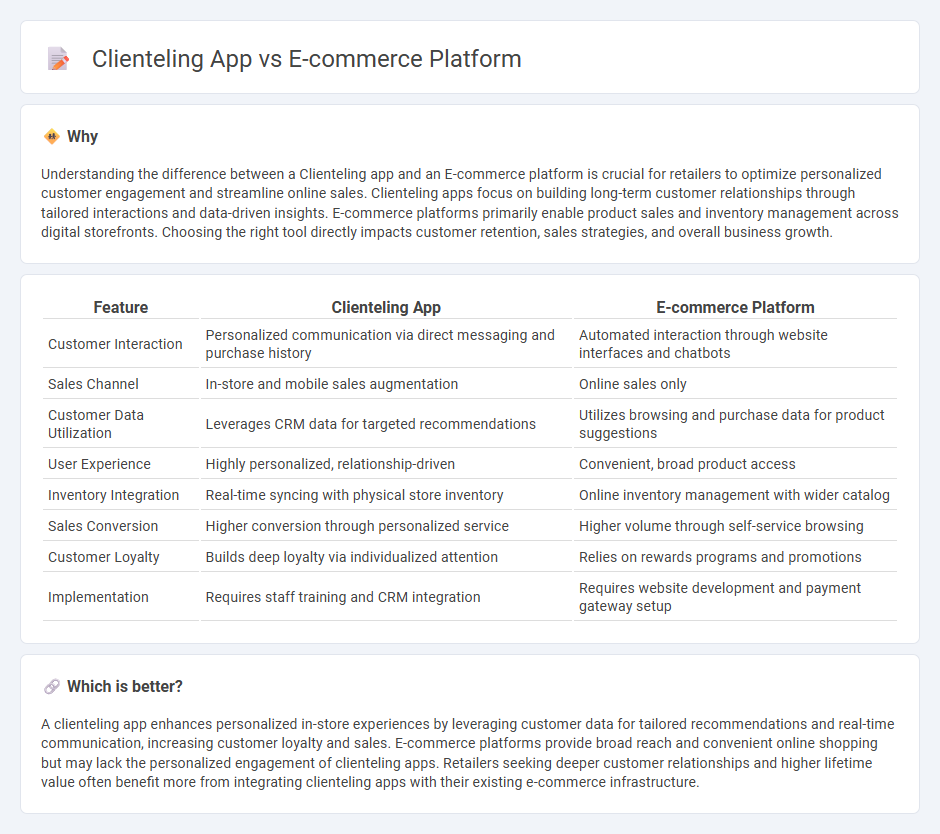
Retail Clienteling apps enhance personalized customer experiences by leveraging data such as purchase history, preferences, and real-time engagement, fostering loyalty and increasing sales through targeted recommendations. E-commerce platforms focus on broad accessibility, streamlined transactions, and inventory management, enabling businesses to reach a global market with a vast product catalog. Discover how integrating Clienteling apps with e-commerce platforms can transform your retail strategy for deeper customer connections and higher conversion rates.
Why it is important
Understanding the difference between a Clienteling app and an E-commerce platform is crucial for retailers to optimize personalized customer engagement and streamline online sales. Clienteling apps focus on building long-term customer relationships through tailored interactions and data-driven insights. E-commerce platforms primarily enable product sales and inventory management across digital storefronts. Choosing the right tool directly impacts customer retention, sales strategies, and overall business growth.
Comparison Table
| Feature | Clienteling App | E-commerce Platform |
|---|---|---|
| Customer Interaction | Personalized communication via direct messaging and purchase history | Automated interaction through website interfaces and chatbots |
| Sales Channel | In-store and mobile sales augmentation | Online sales only |
| Customer Data Utilization | Leverages CRM data for targeted recommendations | Utilizes browsing and purchase data for product suggestions |
| User Experience | Highly personalized, relationship-driven | Convenient, broad product access |
| Inventory Integration | Real-time syncing with physical store inventory | Online inventory management with wider catalog |
| Sales Conversion | Higher conversion through personalized service | Higher volume through self-service browsing |
| Customer Loyalty | Builds deep loyalty via individualized attention | Relies on rewards programs and promotions |
| Implementation | Requires staff training and CRM integration | Requires website development and payment gateway setup |
Which is better?
A clienteling app enhances personalized in-store experiences by leveraging customer data for tailored recommendations and real-time communication, increasing customer loyalty and sales. E-commerce platforms provide broad reach and convenient online shopping but may lack the personalized engagement of clienteling apps. Retailers seeking deeper customer relationships and higher lifetime value often benefit more from integrating clienteling apps with their existing e-commerce infrastructure.
Connection
Clienteling apps integrate seamlessly with e-commerce platforms by leveraging customer data to deliver personalized shopping experiences and targeted promotions. This connection enables retailers to unify in-store and online interactions, enhancing customer insights and driving higher retention through tailored recommendations. Synchronizing purchase history and behavioral analytics across both channels optimizes inventory management and boosts overall sales performance.
Key Terms
Online storefront
E-commerce platforms provide a comprehensive online storefront enabling businesses to showcase products, manage transactions, and reach a global customer base through customizable websites and integrated payment systems. Clienteling apps enhance this experience by offering personalized customer interactions, tailored product recommendations, and data-driven insights to boost customer loyalty within the online storefront. Explore the benefits of integrating clienteling apps with your e-commerce platform to optimize customer engagement and sales.
Personalized customer interaction
E-commerce platforms provide broad, scalable solutions for online shopping, enabling users to browse, purchase, and manage orders efficiently. Clienteling apps enhance personalized customer interaction by leveraging real-time data, purchase history, and preferences to offer tailored recommendations and build stronger customer relationships. Discover how integrating clienteling features can transform your e-commerce strategy and boost customer loyalty.
Omnichannel integration
E-commerce platforms streamline online sales by integrating product catalogs, payment gateways, and inventory management across multiple digital channels. Clienteling apps enhance personalized customer interactions by providing sales associates with real-time data on client preferences, purchase history, and behavior across in-store and online touchpoints, enabling seamless omnichannel experiences. Discover how combining these solutions can transform your retail strategy and elevate customer engagement.
Source and External Links
What is an Ecommerce Platform? - Salesforce - An ecommerce platform is software that helps businesses set up and run online stores by managing product displays, payment processing, order management, marketing, analytics, and CRM functions to create a seamless shopping experience and efficient business operations.
What is an ecommerce platform? - Optimizely - An ecommerce platform is a software solution that centralizes management of product catalogs, purchases, customer relationships, omnichannel marketing, and digital sales to meet consumer demand for online shopping across B2B and B2C markets.
9 Best Ecommerce Platforms of 2025 (Know Your Options) - Ecommerce platforms come in three types: SaaS (cloud-hosted, easy to use), composable, and open-source, offering different balances of cost, customization, and flexibility for businesses to build and operate online stores.
 dowidth.com
dowidth.com